Lei Liang
Temp-R1: A Unified Autonomous Agent for Complex Temporal KGQA via Reverse Curriculum Reinforcement Learning
Jan 26, 2026Abstract:Temporal Knowledge Graph Question Answering (TKGQA) is inherently challenging, as it requires sophisticated reasoning over dynamic facts with multi-hop dependencies and complex temporal constraints. Existing methods rely on fixed workflows and expensive closed-source APIs, limiting flexibility and scalability. We propose Temp-R1, the first autonomous end-to-end agent for TKGQA trained through reinforcement learning. To address cognitive overload in single-action reasoning, we expand the action space with specialized internal actions alongside external action. To prevent shortcut learning on simple questions, we introduce reverse curriculum learning that trains on difficult questions first, forcing the development of sophisticated reasoning before transferring to easier cases. Our 8B-parameter Temp-R1 achieves state-of-the-art performance on MultiTQ and TimelineKGQA, improving 19.8% over strong baselines on complex questions. Our work establishes a new paradigm for autonomous temporal reasoning agents. Our code will be publicly available soon at https://github.com/zjukg/Temp-R1.
Sparse-RL: Breaking the Memory Wall in LLM Reinforcement Learning via Stable Sparse Rollouts
Jan 15, 2026Abstract:Reinforcement Learning (RL) has become essential for eliciting complex reasoning capabilities in Large Language Models (LLMs). However, the substantial memory overhead of storing Key-Value (KV) caches during long-horizon rollouts acts as a critical bottleneck, often prohibiting efficient training on limited hardware. While existing KV compression techniques offer a remedy for inference, directly applying them to RL training induces a severe policy mismatch, leading to catastrophic performance collapse. To address this, we introduce Sparse-RL empowers stable RL training under sparse rollouts. We show that instability arises from a fundamental policy mismatch among the dense old policy, the sparse sampler policy, and the learner policy. To mitigate this issue, Sparse-RL incorporates Sparsity-Aware Rejection Sampling and Importance-based Reweighting to correct the off-policy bias introduced by compression-induced information loss. Experimental results show that Sparse-RL reduces rollout overhead compared to dense baselines while preserving the performance. Furthermore, Sparse-RL inherently implements sparsity-aware training, significantly enhancing model robustness during sparse inference deployment.
ClinDEF: A Dynamic Evaluation Framework for Large Language Models in Clinical Reasoning
Dec 29, 2025Abstract:Clinical diagnosis begins with doctor-patient interaction, during which physicians iteratively gather information, determine examination and refine differential diagnosis through patients' response. This dynamic clinical-reasoning process is poorly represented by existing LLM benchmarks that focus on static question-answering. To mitigate these gaps, recent methods explore dynamic medical frameworks involving interactive clinical dialogues. Although effective, they often rely on limited, contamination-prone datasets and lack granular, multi-level evaluation. In this work, we propose ClinDEF, a dynamic framework for assessing clinical reasoning in LLMs through simulated diagnostic dialogues. Grounded in a disease knowledge graph, our method dynamically generates patient cases and facilitates multi-turn interactions between an LLM-based doctor and an automated patient agent. Our evaluation protocol goes beyond diagnostic accuracy by incorporating fine-grained efficiency analysis and rubric-based assessment of diagnostic quality. Experiments show that ClinDEF effectively exposes critical clinical reasoning gaps in state-of-the-art LLMs, offering a more nuanced and clinically meaningful evaluation paradigm.
PushGen: Push Notifications Generation with LLM
Dec 16, 2025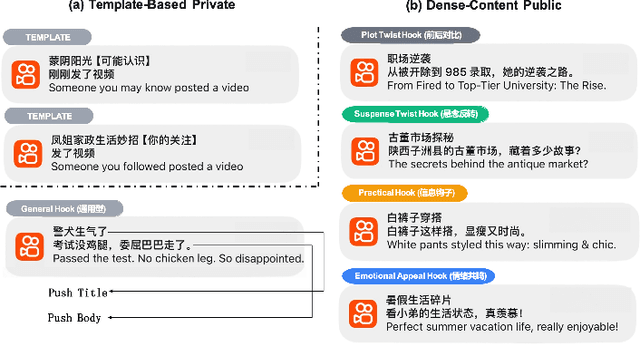
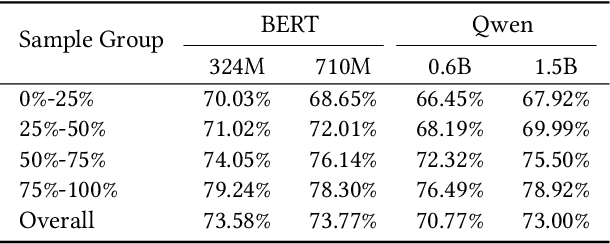
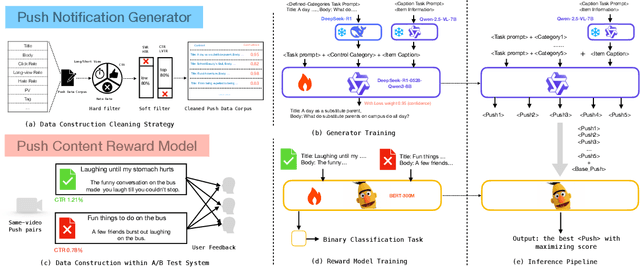

Abstract:We present PushGen, an automated framework for generating high-quality push notifications comparable to human-crafted content. With the rise of generative models, there is growing interest in leveraging LLMs for push content generation. Although LLMs make content generation straightforward and cost-effective, maintaining stylistic control and reliable quality assessment remains challenging, as both directly impact user engagement. To address these issues, PushGen combines two key components: (1) a controllable category prompt technique to guide LLM outputs toward desired styles, and (2) a reward model that ranks and selects generated candidates. Extensive offline and online experiments demonstrate its effectiveness, which has been deployed in large-scale industrial applications, serving hundreds of millions of users daily.
Self-Correction Distillation for Structured Data Question Answering
Nov 17, 2025Abstract:Structured data question answering (QA), including table QA, Knowledge Graph (KG) QA, and temporal KG QA, is a pivotal research area. Advances in large language models (LLMs) have driven significant progress in unified structural QA frameworks like TrustUQA. However, these frameworks face challenges when applied to small-scale LLMs since small-scale LLMs are prone to errors in generating structured queries. To improve the structured data QA ability of small-scale LLMs, we propose a self-correction distillation (SCD) method. In SCD, an error prompt mechanism (EPM) is designed to detect errors and provide customized error messages during inference, and a two-stage distillation strategy is designed to transfer large-scale LLMs' query-generation and error-correction capabilities to small-scale LLM. Experiments across 5 benchmarks with 3 structured data types demonstrate that our SCD achieves the best performance and superior generalization on small-scale LLM (8B) compared to other distillation methods, and closely approaches the performance of GPT4 on some datasets. Furthermore, large-scale LLMs equipped with EPM surpass the state-of-the-art results on most datasets.
Thinker: Training LLMs in Hierarchical Thinking for Deep Search via Multi-Turn Interaction
Nov 14, 2025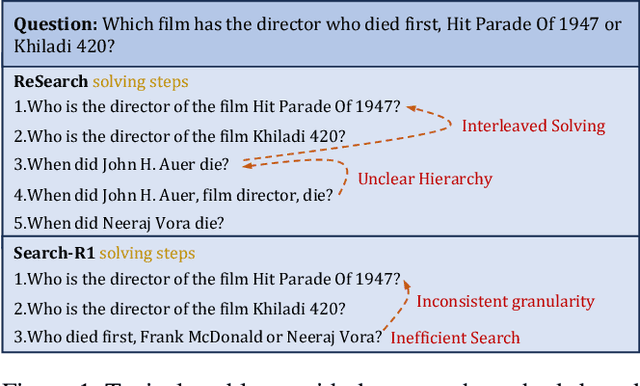
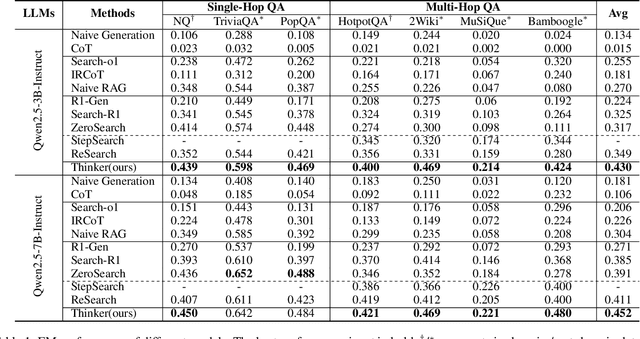
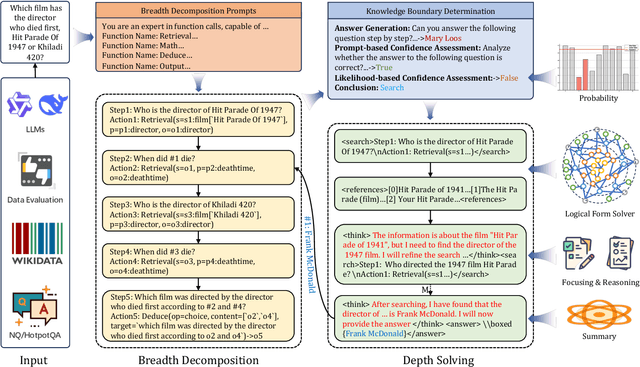

Abstract:Efficient retrieval of external knowledge bases and web pages is crucial for enhancing the reasoning abilities of LLMs. Previous works on training LLMs to leverage external retrievers for solving complex problems have predominantly employed end-to-end reinforcement learning. However, these approaches neglect supervision over the reasoning process, making it difficult to guarantee logical coherence and rigor. To address these limitations, we propose Thinker, a hierarchical thinking model for deep search through multi-turn interaction, making the reasoning process supervisable and verifiable. It decomposes complex problems into independently solvable sub-problems, each dually represented in both natural language and an equivalent logical function to support knowledge base and web searches. Concurrently, dependencies between sub-problems are passed as parameters via these logical functions, enhancing the logical coherence of the problem-solving process. To avoid unnecessary external searches, we perform knowledge boundary determination to check if a sub-problem is within the LLM's intrinsic knowledge, allowing it to answer directly. Experimental results indicate that with as few as several hundred training samples, the performance of Thinker is competitive with established baselines. Furthermore, when scaled to the full training set, Thinker significantly outperforms these methods across various datasets and model sizes. The source code is available at https://github.com/OpenSPG/KAG-Thinker.
Knowledge-Augmented Long-CoT Generation for Complex Biomolecular Reasoning
Nov 11, 2025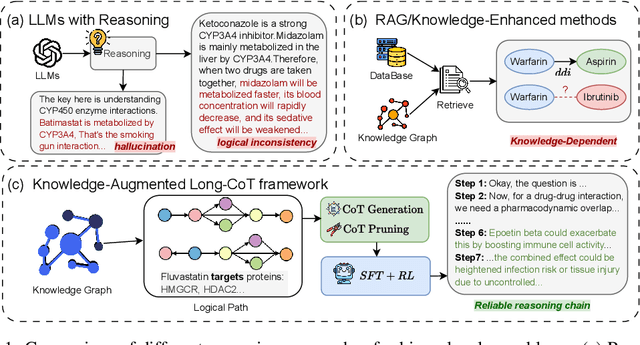
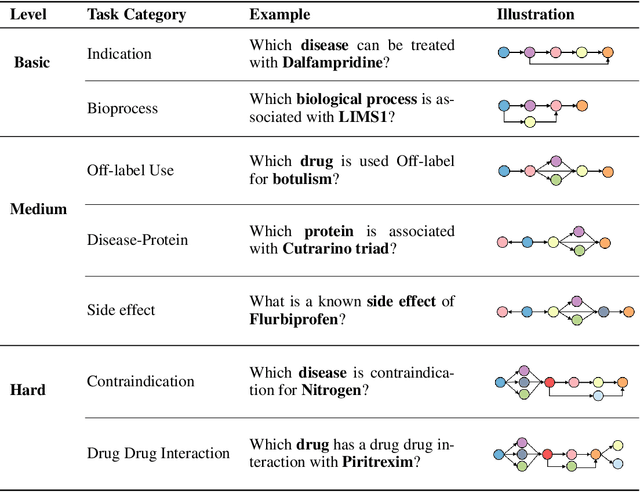
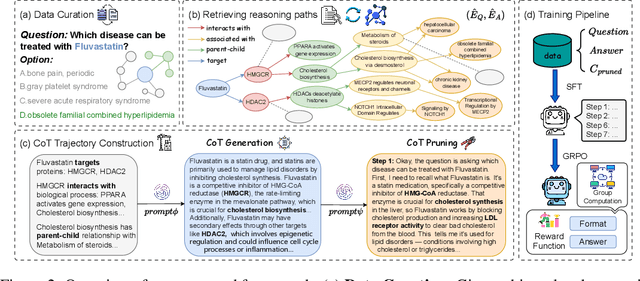
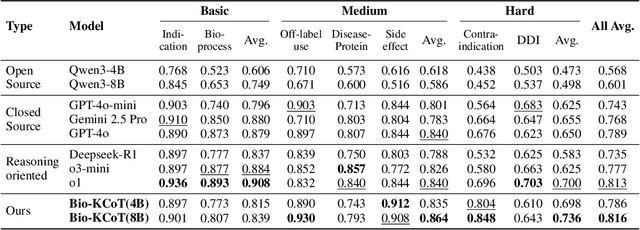
Abstract:Understanding complex biomolecular mechanisms requires multi-step reasoning across molecular interactions, signaling cascades, and metabolic pathways. While large language models(LLMs) show promise in such tasks, their application to biomolecular problems is hindered by logical inconsistencies and the lack of grounding in domain knowledge. Existing approaches often exacerbate these issues: reasoning steps may deviate from biological facts or fail to capture long mechanistic dependencies. To address these challenges, we propose a Knowledge-Augmented Long-CoT Reasoning framework that integrates LLMs with knowledge graph-based multi-hop reasoning chains. The framework constructs mechanistic chains via guided multi-hop traversal and pruning on the knowledge graph; these chains are then incorporated into supervised fine-tuning to improve factual grounding and further refined with reinforcement learning to enhance reasoning reliability and consistency. Furthermore, to overcome the shortcomings of existing benchmarks, which are often restricted in scale and scope and lack annotations for deep reasoning chains, we introduce PrimeKGQA, a comprehensive benchmark for biomolecular question answering. Experimental results on both PrimeKGQA and existing datasets demonstrate that although larger closed-source models still perform well on relatively simple tasks, our method demonstrates clear advantages as reasoning depth increases, achieving state-of-the-art performance on multi-hop tasks that demand traversal of structured biological knowledge. These findings highlight the effectiveness of combining structured knowledge with advanced reasoning strategies for reliable and interpretable biomolecular reasoning.
Evontree: Ontology Rule-Guided Self-Evolution of Large Language Models
Oct 30, 2025
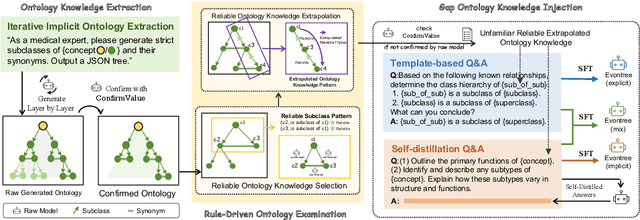

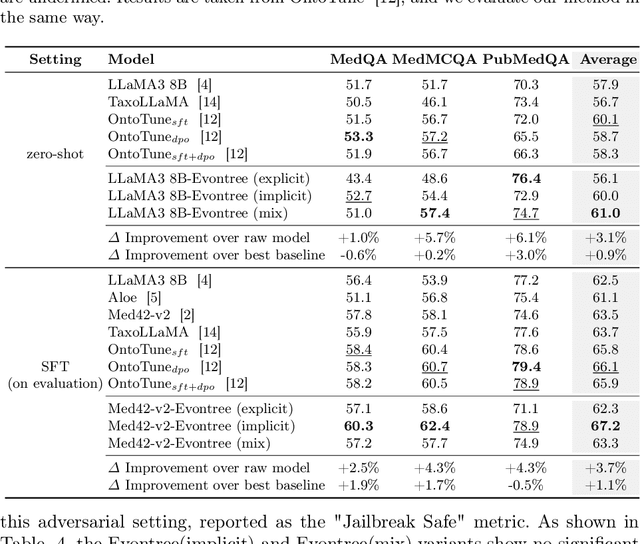
Abstract:Large language models (LLMs) have demonstrated exceptional capabilities across multiple domains by leveraging massive pre-training and curated fine-tuning data. However, in data-sensitive fields such as healthcare, the lack of high-quality, domain-specific training corpus hinders LLMs' adaptation for specialized applications. Meanwhile, domain experts have distilled domain wisdom into ontology rules, which formalize relationships among concepts and ensure the integrity of knowledge management repositories. Viewing LLMs as implicit repositories of human knowledge, we propose Evontree, a novel framework that leverages a small set of high-quality ontology rules to systematically extract, validate, and enhance domain knowledge within LLMs, without requiring extensive external datasets. Specifically, Evontree extracts domain ontology from raw models, detects inconsistencies using two core ontology rules, and reinforces the refined knowledge via self-distilled fine-tuning. Extensive experiments on medical QA benchmarks with Llama3-8B-Instruct and Med42-v2 demonstrate consistent outperformance over both unmodified models and leading supervised baselines, achieving up to a 3.7% improvement in accuracy. These results confirm the effectiveness, efficiency, and robustness of our approach for low-resource domain adaptation of LLMs.
RTQA : Recursive Thinking for Complex Temporal Knowledge Graph Question Answering with Large Language Models
Sep 04, 2025Abstract:Current temporal knowledge graph question answering (TKGQA) methods primarily focus on implicit temporal constraints, lacking the capability of handling more complex temporal queries, and struggle with limited reasoning abilities and error propagation in decomposition frameworks. We propose RTQA, a novel framework to address these challenges by enhancing reasoning over TKGs without requiring training. Following recursive thinking, RTQA recursively decomposes questions into sub-problems, solves them bottom-up using LLMs and TKG knowledge, and employs multi-path answer aggregation to improve fault tolerance. RTQA consists of three core components: the Temporal Question Decomposer, the Recursive Solver, and the Answer Aggregator. Experiments on MultiTQ and TimelineKGQA benchmarks demonstrate significant Hits@1 improvements in "Multiple" and "Complex" categories, outperforming state-of-the-art methods. Our code and data are available at https://github.com/zjukg/RTQA.
SKA-Bench: A Fine-Grained Benchmark for Evaluating Structured Knowledge Understanding of LLMs
Jul 23, 2025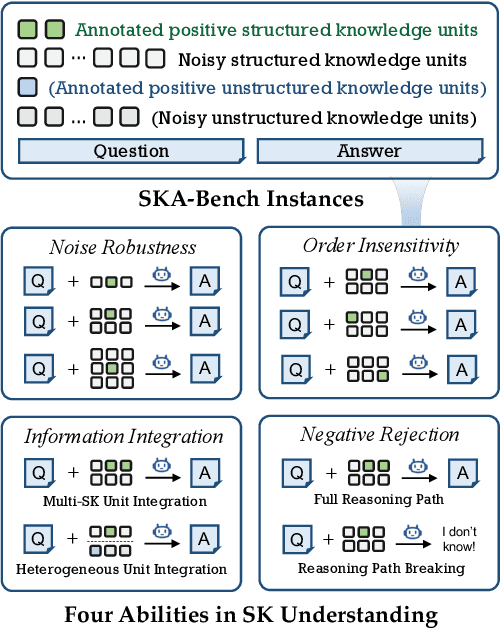

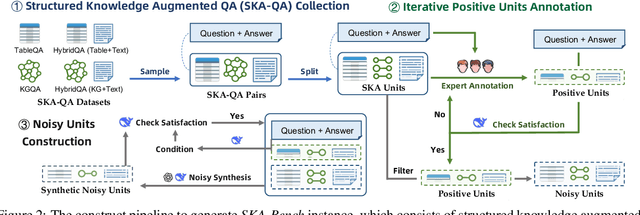
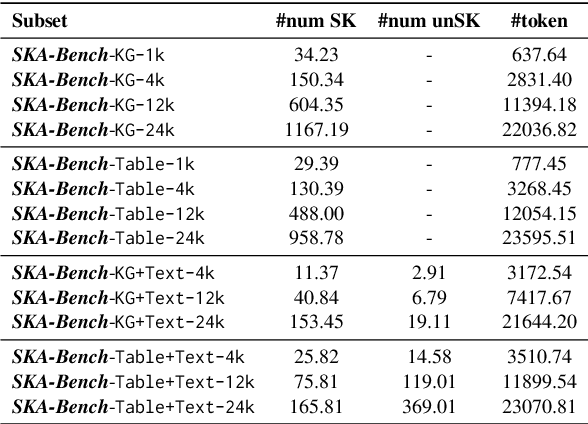
Abstract:Although large language models (LLMs) have made significant progress in understanding Structured Knowledge (SK) like KG and Table, existing evaluations for SK understanding are non-rigorous (i.e., lacking evaluations of specific capabilities) and focus on a single type of SK. Therefore, we aim to propose a more comprehensive and rigorous structured knowledge understanding benchmark to diagnose the shortcomings of LLMs. In this paper, we introduce SKA-Bench, a Structured Knowledge Augmented QA Benchmark that encompasses four widely used structured knowledge forms: KG, Table, KG+Text, and Table+Text. We utilize a three-stage pipeline to construct SKA-Bench instances, which includes a question, an answer, positive knowledge units, and noisy knowledge units. To evaluate the SK understanding capabilities of LLMs in a fine-grained manner, we expand the instances into four fundamental ability testbeds: Noise Robustness, Order Insensitivity, Information Integration, and Negative Rejection. Empirical evaluations on 8 representative LLMs, including the advanced DeepSeek-R1, indicate that existing LLMs still face significant challenges in understanding structured knowledge, and their performance is influenced by factors such as the amount of noise, the order of knowledge units, and hallucination phenomenon. Our dataset and code are available at https://github.com/Lza12a/SKA-Bench.
 Add to Chrome
Add to Chrome Add to Firefox
Add to Firefox Add to Edge
Add to Edge